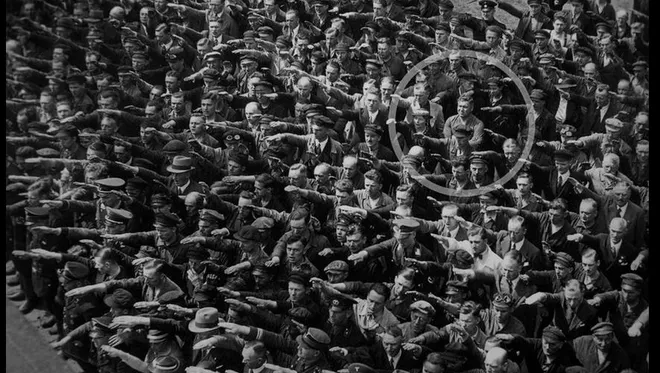- a newsletter
- Posts
- A code
A code
Honor. Courage. Wisdom. Something else?
One of the most important things you can develop if you desire both a flourishing life and to be a rigorous, free, and independent thinker is a code—a personal philosophy to guide you. Without this guide to inform our daily decisions and planning, we're no more than an unmoored boat with a broken mast in a stormy sea, pulled into whatever direction forces of nature will us to be.
Most people are like this: swayed and pulled by the crowd and the mainstream, thinking and feeling based on the latest social media memes emanating from their tribe. See, thinking is not something we do alone; it’s often mistaken as a solitary activity when it’s quite communal. Your partner, colleagues, friends, family, and neighbors all influence how you think, whether you know it or not. The social attitudes of your community, the ads you consume, the TV you watch, or the podcasts you listen to. This communal nature of thinking opens us up to exploitation, both direct and indirect. We may engage with intolerant views or unethical behavior simply because, well— everyone around me is doing it, so it’s gotta be right, right?
Without a coherent philosophy, we default to social conformity, obedience, and expedience. This may make our lives easier or more convenient, but it is also just as likely to lead us into questionable behavior or lackadaisical thinkers. Without a personal code, we not only are more likely to be undifferentiated thinkers but significantly more likely to enable harm in this world by making us vulnerable to dangerous views and social exploitation.

August Landmesser, 1936
This is one of the reasons why developing a personal philosophy matters. It increases your resilience to these direct and indirect social exploitations of your behavior and thinking. Having a personal code—a set of values you have committed to striving for, adhering to, and living up to—helps you be more aware of these outside influences. Your code is intended to be both a lens with which to interpret the world and a filter for information to pass through.
The second reason why building this personal philosophy matters is that your code is your operating system for a flourishing life. Once you have it, you will not easily want to give it up because not only does it help you be a better independent operator in the world, but you will notice that you’re simply getting more out of life.
It makes you powerful because it can never be taken away without your consent. It helps you be a leader, as your behavior will inspire others during good times and bad. The code matters because the code is bigger than our immediate wants and needs. The code determines the types of behavior we model for others. Your code will make you realize what truly matters and help lead you to a more flourishing life. No longer will you be another ship trying to follow the leader, tossed in the ocean, but you’ll be your own privateer and captain.
Finally, it’s important to acknowledge that following a personal code is, at times, hard, challenging, and demanding. It will be constantly tested, and there will always be temptations to do things the easy way instead of the right way.
Sometimes, you will not meet the conduct you have set for yourself with your code— that’s OK. Sometimes, even the most secure network fails to keep the bad guys out, too. What matters is recommitting yourself to it daily and consistently evaluating if your code is having the desired effect. Though we want our code to be firm, we don’t want it to be rigid; sometimes, life demands that we evolve to meet evolving challenges.
Writing your Code
While a code is intended to be practical in nature, it is a philosophical endeavor. Your code can be as complex or simple as you like; what matters is, similar to a yearly theme, that it has resonance and that you have done the work to determine it.
Though you can draw on any philosophical tradition to write your code (and if you read enough philosophy, you’ll eventually have a proverbial Lego box to choose from!) The most straightforward and intuitive place to start is virtue ethics.
Virtue ethics are one of the oldest and most widely adopted frameworks for a code and can be found in philosophies whose birthplaces range from Japan to Greece.
Virtue ethics, rather than following specific rules or maximizing outcomes, focuses on developing character traits and habits that embody excellence. It asks, "What kind of person should I be?" instead of "What should I do?" emphasizing that good actions flow naturally from a virtuous character formed through practice and reflection.
The traditional Bushido code (the "Way of the Warrior"), for example, is typically described as having seven core virtues, though interpretations can vary. Here are the main virtues of Bushido:
Gi (Integrity/Righteousness) - Acting with honesty and justice, making decisions based on what is right rather than expedient
Yu (Courage) - Facing challenges with bravery, standing up for what's right regardless of personal risk
Jin (Compassion/Benevolence) - Showing kindness, empathy and concern for others, including adversaries
Rei (Respect/Courtesy) - Demonstrating proper etiquette and respect toward others regardless of status
Makoto/Shin (Sincerity/Honesty) - Being genuine and truthful in word and deed, without deception
Meiyo (Honor) - Maintaining personal dignity and reputation through honorable actions
Chugi (Loyalty/Duty) - Maintaining commitment to one's responsibilities, leaders, and principles

A samurai in his armor in the 1860s. Hand-colored photograph by Felice Beato
Yours doesn’t have to be 7— the stoics, for example, recognize four main virtues:
Wisdom (Sophia) - The knowledge of what is good, bad, and neither, allowing one to navigate life's complexities with clear judgment
Courage (Andreia) - The fortitude to face adversity and act according to wisdom even when difficult or frightening
Justice (Dikaiosyne) - Living with fairness and integrity toward others, recognizing our duty to contribute to the common good
Temperance (Sophrosyne) - Exercising moderation and self-discipline, avoiding excess, and maintaining harmony within oneself.
So grab a pen and paper and ask yourself:
What are qualities you admire in others? What traits would you like to see more of in your community? What kind of qualities do I want others to see In me? Why these ones?
If any of the virtues mentioned above particularly resonate with you, that’s great! I still encourage you to sit down and write them out yourself. Some questions you may want to ask are: Why do these virtues, in particular, resonate with you? How do you think you want to embody them? Do you know anyone who already does?
Writing is a powerful tool for self-reflection and solidifying our knowledge.
Maintaining (and living) the code
So, let me share some points from my personal experience that I hope will help you. Now comes the hardest and most rewarding part. I have been working on developing code for myself for just shy of 10 years.
I say “been working on it” because it is a constantly changing process. You iterate, and repeat, and remind yourself. It is hard to live up to the values you set out to live up to. It is so goddamn easy to put them aside when it’s expedient.
The most essential piece here is repetition. In the same way a person of faith should study their religion, you should study yourself, your code, and your philosophy on repeat. It is through this repetition and ongoing evaluation that we integrate ideas. It is how we learn and fend off unwanted influences. It is how we remind ourselves of what truly matters.
I will keep constant watch over myself and — most usefully — will put each day up for review. For this is what makes us evil — that none of us looks back upon our own lives. We reflect upon only that which we are about to do. And yet our plans for the future descend from the past."
What began as a journey into mindfulness to deal with stress evolved into a pursuit of Stoicism, Buddhism, and, more recently, Taoism. At some point, I could not tell you when, I realized that living a flourishing life doesn’t have to mean sticking to just one school. In the words of Bruce Lee, we can Absorb what is useful, discard what is useless, and add what is specifically our own.
I won’t tell you it’s easy—it’s not; it is hard. It is a commitment, but it is rewarding. My commitment to this practice has made me a stronger person, a better partner, friend, and colleague. I don’t claim to always achieve what I set out to in the morning, but I do try to recommit every day and make the time to evaluate how I’ve done. My code is the cornerstone for how I seek to support the village.
This is as true for you and me as it is for famous people known for their character. Be it Cato the Younger, Martin Luther King or Gandhi, they did not come up with their value system once, and that was it— they awoke every day and aimed to recommit themselves to their philosophies. Undoubtedly, they fell short at times, as you will and as I do. But, it is in the striving that we find growth, the opportunity to do good, to be free, and to contribute to the world in a way greater than ourselves. It is a small, meaningful way of putting more into the world of what we want to see in it.
If you feel intimidated or want to read more before you do the work, there are some good places to start. The resources below helped make things feel more approachable for me. They are not comprehensive but instead are meant to be a good place to help you also “get going.” I hope they help you, too. Best of Luck, and don’t hesitate to reach out.